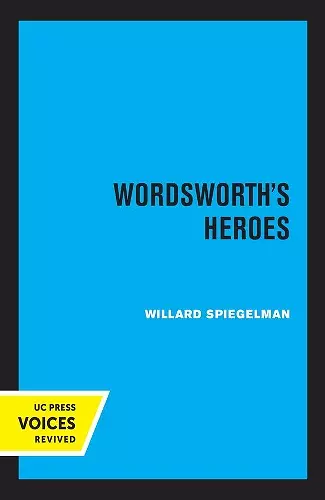Wordsworth's Heroes
Format:Paperback
Publisher:University of California Press
Published:11th May '23
£34.00
Supplier delay - available to order, but may take longer than usual.

Wordsworth’s Heroes reframes the poet of “egotistical sublime” fame as a maker of ordinary heroism—someone who finds grandeur not at Thermopylae but in cottages, churchyards, and the habits of speech that shape moral character. Willard Spiegelman assembles a gallery of Wordsworth’s “representative men and women”—readers, children, and old men—while staging a decisive rethink of the poet’s alleged self-absorption. Anchored by a fresh account of “Character of the Happy Warrior,” the book shows how Wordsworth abstracts heroism from biography (Nelson) into a type available to “every man in arms”—and, crucially, to noncombatants in the “mild concerns of ordinary life.” Through close readings that braid rhetoric, prosody, and ethics, Spiegelman connects the Happy Warrior to the leech-gatherer of “Resolution and Independence,” to the sculptural presences of “Yew-Trees,” and to Wordsworth’s lifelong negotiation between action and contemplation (agere et pati). The result is a Wordsworth placed not at the margins as eccentric prophet but at the center of the “commonal” (to borrow Wallace Stevens), where the heroic becomes a shared vocation learned by imitation, memory, and speech.
Organized with the classroom and the scholar equally in mind, Wordsworth’s Heroes pairs thematic chapters on readers, children, and elders with sustained interpretations of The Prelude, The White Doe of Rylstone, and The Excursion. Spiegelman tracks how the “divisionary” imagination of the late poems turns characters into instructive exempla, while earlier lyrics test how far happiness, suffering, and endurance can be made heroic without losing their ordinariness. Along the way, the study situates Wordsworth among ancient and modern theorists of greatness—from Theophrastus and Cicero to Emerson, Carlyle, and Stevens—showing how his poetry both absorbs and resists heroic paradigms. This is scholarly criticism with the cadence of literary advocacy: lucid, historically alert, and attentive to how diction, syntax, and stanza shape ethical vision. For readers of Romanticism, narrative, and moral philosophy, Spiegelman offers a compelling case that Wordsworth’s truest heroes are “ourselves”—not exceptions to, but exponents of, the human commonwealth.
This title is part of UC Press's Voices Revived program, which commemorates University of California Press’s mission to seek out and cultivate the brightest minds and give them voice, reach, and impact. Drawing on a backlist dating to 1893, Voices Revived makes high-quality, peer-reviewed scholarship accessible once again...
ISBN: 9780520338951
Dimensions: 210mm x 148mm x 15mm
Weight: 363g
274 pages